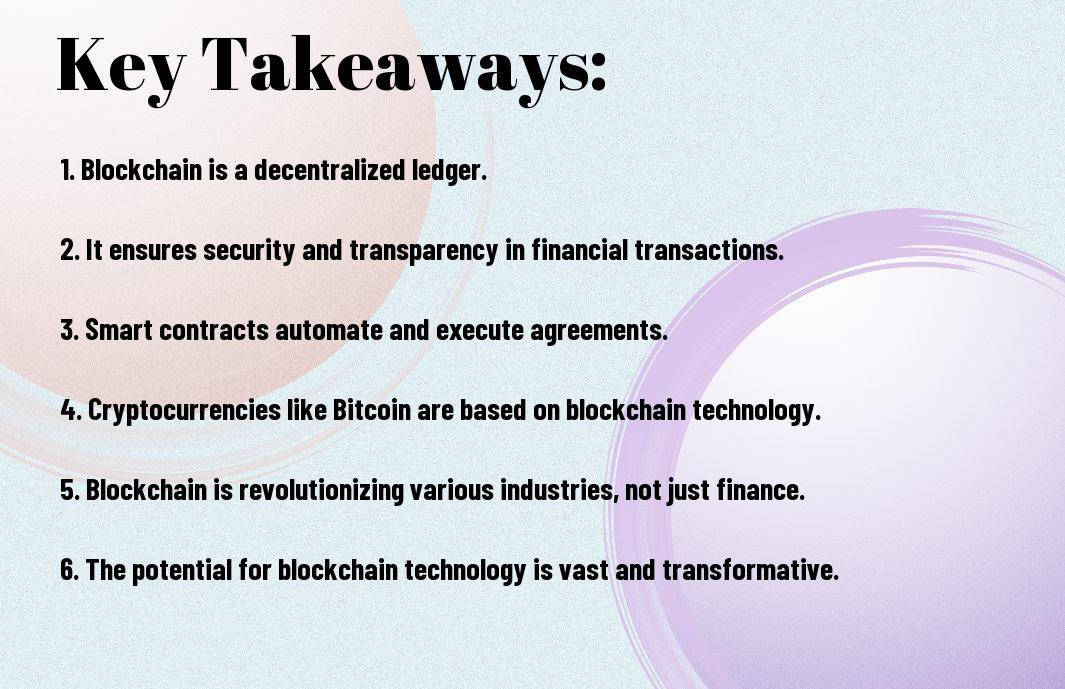
Newsletter Subscribe
Enter your email address below and subscribe to our newsletter

Enter your email address below and subscribe to our newsletter

Blockchain technology is at the forefront of transforming the financial industry, offering transparency, security, and efficiency like never before. This innovative technology is reshaping how financial transactions are conducted, providing a decentralized platform that eliminates the need for intermediaries.
Understanding the intricacies of blockchain is crucial for grasping its immense potential and the disruption it brings to traditional financial systems. By delving into the core concepts and workings of blockchain, we can fully appreciate how this groundbreaking technology is revolutionizing finance and paving the way for a more secure and efficient future.


One of the fundamental concepts behind blockchain technology is decentralization. In a traditional centralized system, like a bank, a single entity controls all transactions, storing and managing all the data. However, in a decentralized system, there is no central authority. Instead, transactions are verified and recorded by a network of computers, known as nodes, spread across the globe.
Any discussion about blockchain technology must include an understanding of cryptographic principles. These principles ensure that data stored on the blockchain is secure and tamper-proof. Cryptography involves using complex mathematical algorithms to encrypt data, making it virtually impossible for unauthorized parties to modify or access it without the proper keys.
With a solid foundation in cryptography, blockchain technology offers a secure and transparent way to store and transfer data, making it ideal for financial transactions, supply chain management, and even voting systems.
Blockchain technology gets its name from the way data is structured – into blocks. Each block contains a list of transactions, a timestamp, and a unique identifier called a hash. When a new block is created, it is linked to the previous block through its hash, creating a chain of blocks – thus forming a blockchain.
The structure of a block ensures the integrity and order of transactions, as any attempt to alter the data in one block would require changing all subsequent blocks, making blockchain highly secure and resistant to tampering.
Conceptually, the chain in blockchain represents the sequential order in which blocks are added to the network. Each block contains the hash of the previous block, creating a chain of blocks linked together. This chain structure ensures the immutability and transparency of the data stored on the blockchain, as any changes to a single block would break the chain and be immediately detected by the network.
Plus, the decentralized nature of blockchain technology ensures that there is no single point of failure, making it a robust and secure system for storing and transferring digital assets.
For centuries, ledgers have been crucial in documenting transactions and ensuring transparency in financial dealings. However, the advent of blockchain technology has revolutionized the way we look at these records. Developed in 2008 by an unknown person or group of people using the pseudonym Satoshi Nakamoto, blockchain was originally created as a public transaction ledger for the cryptocurrency Bitcoin. Since then, it has evolved to have far-reaching implications beyond its initial application.
For any technology to truly thrive, it must be able to adapt and find relevance in various sectors. This holds true for blockchain, which has now expanded beyond Bitcoin to be utilized in a myriad of industries such as supply chain management, healthcare, and voting systems. The underlying principles of blockchain – decentralization, transparency, and security – make it an ideal solution for industries seeking to streamline operations and enhance trust among stakeholders.
Blockchain technology offers a novel way to secure data and transactions, eliminating the need for intermediaries and creating a tamper-proof record of every interaction. With transparency and immutability being its cornerstone features, blockchain has the potential to revolutionize how we conduct business and interact with one another.

For the past decade, Bitcoin has been the face of cryptocurrency, often referred to as digital gold. Introduced by an anonymous entity known as Satoshi Nakamoto in 2008, Bitcoin was the first decentralized digital currency that operates without a central authority or intermediary. It utilizes blockchain technology to enable secure and transparent transactions, revolutionizing the way we perceive and interact with traditional currency systems.
To complement Bitcoin’s pioneering initiative, a plethora of alternative cryptocurrencies, known as altcoins, have emerged. These digital assets offer unique features and functions, catering to different use cases and preferences within the cryptocurrency ecosystem. Altcoins such as Ethereum, Ripple, and Litecoin have gained significant traction, showcasing the growing diversity and versatility of the digital currency landscape.
This expansion of cryptocurrencies beyond Bitcoin reflects the increasing acceptance and adoption of blockchain technology across various industries globally. With diverse altcoins offering specialized solutions and services, the cryptocurrency market continues to evolve and innovate, presenting new opportunities and challenges for investors and users alike.
This subsection provides a deeper insight into one of the most popular methods of fundraising within the cryptocurrency space – Initial Coin Offerings (ICOs). ICOs enable blockchain projects to raise capital by issuing tokens to investors in exchange for cryptocurrencies like Bitcoin or Ethereum. This fundraising model has gained popularity due to its potential for high returns and early access to innovative blockchain projects.
Blockchain technology has facilitated the proliferation of ICOs, allowing startups and entrepreneurs to access global capital markets efficiently. However, it is crucial for investors to exercise caution and conduct thorough due diligence before participating in ICO campaigns, as they are often associated with regulatory uncertainties and risks.

Noticing the advancements in today’s financial landscape, it’s important to understand the role of smart contracts in revolutionizing finance. For an in-depth exploration of this topic, check out REVOLUTIONIZING FINANCE: Riding the Blockchain… by Alfredo Merlet. Smart contracts are self-executing contracts with the terms of the agreement directly written into code. They run on the blockchain without the need for intermediaries, providing a secure and transparent way to facilitate transactions.
Smart contracts are the building blocks of decentralized applications (DApps), which are applications that run on a decentralized peer-to-peer network rather than a single server. These applications leverage the blockchain technology to enable direct interaction between users without the need for a central authority. Decentralized applications offer enhanced security as they are not controlled by a single entity, making them less susceptible to hacking or downtime.
Decentralized applications cover a wide range of functionalities, from finance and gaming to social networking and supply chain management. They are transforming traditional industries by providing greater efficiency, transparency, and autonomy to users. As the adoption of blockchain technology continues to grow, decentralized applications are poised to play a significant role in reshaping the future of finance and beyond.
Many industries are adopting blockchain technology, but its impact on the financial sector is particularly pronounced. Blockchain is revolutionizing the way traditional banking operates, making transactions more efficient, secure, and transparent.
With blockchain, traditional banking systems are being transformed by streamlining processes and reducing operational costs. By eliminating the need for intermediaries in transactions, blockchain technology enables faster and more cost-effective cross-border payments. Moreover, the immutability of blockchain ensures the integrity of financial records, reducing the risk of fraud and enhancing security for both financial institutions and users.
One of the most significant impacts of blockchain in the financial sector is the disruption it causes in payment processing. Blockchain technology allows for peer-to-peer transactions without the need for a central authority, such as a bank or payment processor. This reduces transaction fees and processing times while increasing accessibility to financial services for underserved populations.
One of the key advantages of blockchain technology in payment processing is its ability to facilitate real-time transactions across borders without the need for traditional intermediaries. This can revolutionize the way global commerce is conducted, making transactions more efficient and cost-effective while improving financial inclusion for individuals and businesses worldwide.
Traditional financial systems are being challenged by the rise of Decentralized Finance (DeFi), where blockchain technology enables the creation of financial services and products without the need for traditional intermediaries. DeFi platforms offer various services such as lending, borrowing, and trading in a decentralized manner, providing users with more control over their assets and financial decisions.
Transforming the financial landscape, DeFi platforms operate autonomously through smart contracts, which are self-executing contracts with predefined rules coded into the blockchain. This eliminates the need for trust in intermediaries, providing users with greater transparency and security in their financial interactions. DeFi is reshaping the financial sector by offering innovative solutions that are accessible to anyone with an internet connection, potentially democratizing finance on a global scale.
For any technology that deals with sensitive information and financial transactions, security is a paramount concern. In blockchain systems, security concerns primarily revolve around the vulnerabilities in smart contracts, private key management, and potential for 51% attacks. Smart contracts, which are self-executing contracts with the terms of the agreement directly written into code, are vulnerable to bugs and exploits. Proper auditing and testing of smart contracts are vital to mitigate these risks. Additionally, secure storage and management of private keys are crucial to prevent unauthorized access and theft of digital assets. Moreover, the risk of a 51% attack, where a single entity gains control of the majority of the network’s mining power, is a pressing concern that can compromise the integrity of the blockchain.
Blockchain technology operates in a complex regulatory landscape, with varying degrees of acceptance and oversight across different jurisdictions. Compliance with existing regulations, such as KYC (Know Your Customer) and AML (Anti-Money Laundering) requirements, is critical for blockchain projects to maintain legitimacy and avoid legal repercussions. Ethical considerations also come into play, especially in industries like healthcare and supply chain, where sensitive data and accountability are crucial. Ensuring privacy, data security, and transparency while adhering to ethical standards is a delicate balance that blockchain applications must achieve to garner trust and adoption.
Considering these challenges and considerations is vital for the successful implementation and adoption of blockchain technology. By addressing security vulnerabilities, complying with regulatory frameworks, and upholding ethical standards, blockchain systems can realize their full potential in revolutionizing finance and various other industries.
Despite being relatively young, blockchain technology has already made significant strides in revolutionizing the financial industry. Its ability to provide security, transparency, and immutability has led to widespread adoption across various sectors. As we look towards the future, it’s important to understand the emerging trends in blockchain technology and its potential impacts on the financial landscape.
Trends: One of the emerging trends in blockchain technology is the increasing integration of smart contracts. Smart contracts are self-executing contracts with the terms of the agreement directly written into code. This automation not only reduces the need for intermediaries but also minimizes the risk of fraud, making transactions more efficient and secure. Another trend is the rise of decentralized finance (DeFi) platforms that offer traditional financial services, such as lending and borrowing, without the need for traditional banks.
Future: The potential impacts of blockchain technology on the future of finance are vast. With its ability to improve efficiency, reduce costs, and enhance security, blockchain has the potential to disrupt traditional financial systems. As more organizations and governments explore the use of blockchain, we can expect to see greater transparency and accountability in financial transactions.
A: Blockchain technology has the potential to empower individuals by giving them more control over their financial assets, eliminating the barriers created by centralized institutions. However, it’s crucial to address regulatory challenges and scalability issues to ensure the sustainable growth of blockchain in finance.
Presently, it is evident that blockchain technology is making significant strides in revolutionizing the way we transact financially. By providing a secure, transparent, and decentralized platform for transactions, blockchain has the potential to streamline processes, reduce costs, and enhance trust in financial transactions. Understanding the intricacies of blockchain technology is vital for anyone looking to harness its potential and stay ahead in the rapidly evolving financial landscape.
A: Blockchain technology is a decentralized, distributed ledger system that securely records transactions across a network of computers. Each transaction is grouped into a “block” and linked together in a chronological chain, hence the name blockchain.
A: Blockchain ensures security through cryptography. Each block contains a cryptographic hash of the previous block, making it tamper-proof. Additionally, transactions are verified by network participants, making it extremely difficult for any single entity to manipulate the system.
A: The key advantages of blockchain technology include transparency, security, immutability, decentralization, and efficiency. It eliminates the need for intermediaries, reduces the risk of fraud, and allows for faster and cheaper transactions.
A: Blockchain is revolutionizing finance by enabling faster and more secure cross-border payments, reducing transaction costs, enabling automated smart contracts, improving transparency in financial transactions, and providing access to financial services for the unbanked population.
A: Smart contracts are self-executing contracts with the terms of the agreement directly written into code. They automatically execute and enforce the terms of the contract when predefined conditions are met, without the need for intermediaries.
A: Yes, blockchain technology has applications beyond finance. It can be used in industries such as healthcare for secure patient data management, supply chain for tracking goods from source to destination, voting systems for transparent elections, and real estate for efficient property transactions.
A: While the energy consumption of blockchain technology, especially in proof-of-work systems like Bitcoin, has raised concerns, there are ongoing efforts to develop more energy-efficient consensus mechanisms like proof-of-stake. Additionally, some blockchain projects are exploring ways to offset their environmental impact through carbon credits and renewable energy initiatives.